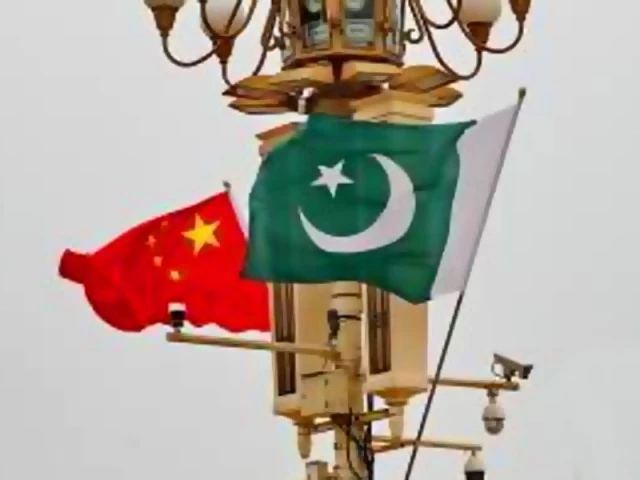Govt clears Rs100b Chinese debt before PM's visit
Liabilities cut by one-fourth to just above Rs300b

Pakistan has decided to release over Rs100 billion to Chinese power plants ahead of Prime Minister Shehbaz Sharif's visit, cutting outstanding dues by nearly one-fourth in a bid to address one of Beijing's key concerns.
According to officials, the Finance Ministry has instructed that the payments be made from the power sector subsidies allocated in the current fiscal year's budget. The Rs100 billion is expected to be disbursed among Chinese power producers within the next few days.
In addition to the Rs100 billion, an amount of Rs8 billion is also given from the regular budget allocations for the Chinese power producers.
The development came days before the departure of Prime Minister Shehbaz Sharif, who is traveling to China this weekend to attend the Head of States meeting of the Shanghai Cooperation Organization (SCO).
The premier is also expected to participate in an investment conference being organised by Pakistan's embassy. The sources said that the prime minister had given instructions to the Finance Ministry to clear Rs100 billion payments to the Chinese Independent Power Producers (IPPs) by August 25th.
As of June this year, the outstanding dues of the China-Pakistan Economic Corridor (CPEC) power projects amounted to Rs423 billion. After the injection, the Chinese dues would reduce by one-fourth to little over Rs300 billion.
There was a slow increase in the Chinese outstanding dues in the last fiscal year but the dues were still piling up.
Since 2017, the country has already paid Rs5.1 trillion in energy costs to the 18 Chinese power plants, which were equal to 92.3% of the billed amount, including interest. Pakistani authorities believe that the actual remaining cost of energy was less than Rs300 billion and the rest of the amount was due to late payment surcharges.
The government is in the process of taking nearly Rs1.3 trillion in fresh loans from the local commercial banks to retire the circular debt that it owes to the state-owned power plants, nuclear power plants, privately owned plants, and the Chinese plants. However, the deal has not yet been formally concluded.
The Rs423 billion unpaid debts are in violation of the 2015 CPEC Energy Framework Agreement, which binds the government to fully clear the dues irrespective of whether the authorities can recover the amounts from the end consumers.
Along with security, the non-fulfilment of CPEC contracts is one of the reasons for slow progress in financial and commercial relations between the two nations. Under the CPEC Energy Framework Agreement, Pakistan was required to create a revolving fund with 21% of the power invoices to protect Chinese firms from the circular debt crisis.
However, the previous government opened a Pakistan Energy Revolving Account at the State Bank of Pakistan (SBP) in October 2022 with Rs48 billion in annual allocations. But it limited the withdrawals to Rs4 billion per month, leading to the current Rs423 billion debt stock.
Out of the Rs48 billion allocations for this fiscal year, the government has processed Rs8 billion payments for July-August period, the sources said.
The Rs100 billion would be distributed among the Chinese as per their billing, according to the Ministry of Energy officials. They said that the majority of the chunk would go to the three largest coal-fired power plants.
Pakistan owed Rs87 billion to the imported coal-fired Sahiwal power plant, while the company received Rs1.14 trillion in the past eight years of its operations. The country also owed Rs69 billion to the coal-fired Hub power project, compared to the Rs834 billion worth of total claims.
The remaining outstanding dues of the coal-fired Port Qasim power plant were Rs85.5 billion, as against the total bills of over Rs1 trillion. The Thar Coal project dues remained at Rs55.5 billion. It had claimed Rs566 billion worth of dues.
The government's energy sector circular debt reduced over Rs800 billion by June this year, thanks to budgetary injections instead of any real improvement in the performance of the sector.
The reported reduction in Circular Debt (CD) for FY 2024-25 is primarily attributed to a one-time stock payment of Rs801 billion rather than any sustained operational efficiency gains, according to a report by Federation of Pakistan Chamber of Commerce and Industry (FPCCI) last week.
It added that this settlement was financed through fiscal measures, not through performance improvements in the power sector.
The FPCCI report stated that Rs801 billion was originally earmarked as a targeted direct subsidy for the consumers. However, it was instead utilized to reduce the circular debt stock, which may distort public perception by overstating the success of reforms and underrepresenting the benefit that consumers should have received directly, according to the FPCCI.
While the headline suggests a net reduction in circular debt, the inclusion of one off adjustmentssuch Prior Year Adjustments and others totalling Rs358 billionmasks the actual trajectory, the report stated. Excluding Rs801 billion stock payment and the temporary relief from these adjustments, the circular debt in fact increased by approximately Rs379 billion, it added.





















COMMENTS (6)
Comments are moderated and generally will be posted if they are on-topic and not abusive.
For more information, please see our Comments FAQ